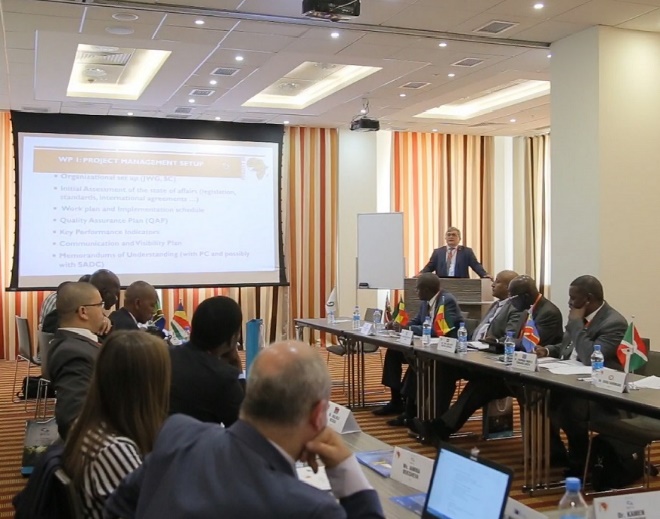Project 60 is advancing to the next stage of activities in Eastern and Central Africa

Project 60 is advancing to the next stage of activities in Eastern and Central Africa
Astana, 17 June 2017. The Steering Committee of Project 60 “Support to the EU CBRN Center of Excellence of East and Central Africa in Nuclear Security” approved a package of provisions and plans for the advancement of the project to its substantial phase. It will include trainings, field exercises and sharing of expertise – all fine-tuned to improve the institutional set-ups, legal regulations and human capabilities that address radiological and nuclear incidents and accidents in the 12 participating countries: Burundi, Democratic Republic of Congo, Ethiopia, Ghana, Kenya, Malawi, Rwanda, The Seychelles, Tanzania, Uganda, Zambia and Namibia. The SC members also discussed how a range of questions about the nuclear security context in their countries could be adressed through coallaboration during the implementation of the project. Take back arrangements for nuclear material and sources to the country of origin, lack of nuclear waste management facilities, and efficient public awareness efforts were the subjects that topped the discussion. Within these concerns, the project’s Communication and Visibility plan was vividly discussed together with the preparation of the project’s website.
Project 60 Steering Committee was convened by the project’s implementing partner - the International Science and Technology Center (ISTC) in Astana on 12 June 2017. Representatives of the European Commission Directorate-General for International Cooperation and Development (DG DEVCO), the European Commission Joint Research Centre (JRC) and of the AESA On-Site Technical Assistance (OSA) took part in the meeting. All international partners and the representatives of the P-60 participating countries that are member states of the South African Development Community discussed at the fringes of the Steering Committee meeting the progress of a parallel project MC 5.01/15B with complementary activities - Support to Southern African States in Nuclear Safety and Safeguards. Four countries are beneficieries of this project – Malawi, Zambia, Tanzania and Namibia, together with the regional intergovernmental organization South African Development Community (SADC). The project addresses the radiological and nuclear risks from uranium mining, milling and transport activities as well as the management of radiological sources. The cooperation with SADC envisages a provision of a web-based electronic system to trace trans-border transportation of uranium ore.
Dr. Eddie Maier, Deputy Head of Unit B5, Head of Sector CBRN, DG DEVCO, European Commission provided comments on the complementarity of P-60 and MC 5.01/15B projects. He outlined the importance of the locally accumulated experience and the crucial role of the African partners in securing the success of the projects.
A third in a row since the official launch of Project 60 last February, the Steering committee meeting in Astana was scheduled to coincide with the CBRN CoE in Central Asia Regional Radiological Emergency Response Table-Top exercise SUNKAR (13-14 June 2017). The RN experts from Eastern and Central Africa were able to observe the exercise and to start anticipating similar exercises in their sub-region. The Project 60 representatives took part in the Special Day on Future Energy and Technologies, dedicated to the 20th anniversary of the International Science and Technology Center. They visited EXPO 2017 ASTANA where next to a model of Kazakhstan’s thermonuclear material testing reactor (Tokamak) is the pavilion hosting 23 Sub-Saharan African countries.

More information about Project 60 at www.istc.int.
The project Support to the European Union Chemical, Biological, Radiological and Nuclear Center of Excellence (EU CBRN CoE) for Eastern and Central Africa in Nuclear Security (Project 60) is funded by the EU Instrument contributing to Peace and Security and is part of the CBRN Centers of Excellence initiative of the European Union. The ISTC will be implementing this project in parallel with a similar initiative, namely Support to Southern African States in Nuclear Safety and Safeguards (Project MC 5.01/15B) under the EU Instrument for Nuclear Safety Cooperation. Conceived as complementary to each other, the two initiatives illustrate the internationally recommended “Triple S” approach addressing simultaneously the nuclear safety, safeguards and security issues.

